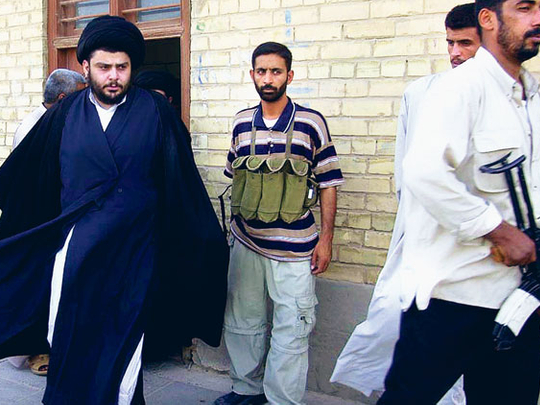
Baghdad: Iran is throwing its weight behind Iraqi Prime Minister Nouri Al Maliki's bid for a second term, political insiders say, an endorsement that could seal his hold on power.
Tehran wields considerable influence over Iraq's two largest Shiite blocs, which formed an alliance this month after coming in second and third in the March 7 parliamentary election. That alliance has virtually ensured they will form another Shiite-dominated government — even though a Sunni-backed party won the most seats.
The US is concerned about Iranian attempts to influence Iraq's political process, a State Department spokesman said on Friday. He reiterated Washington's call not to exclude minority Sunnis from government — something many in Iraq fear could inflame sectarian tensions anew.
Shiite coalitions have ruled Iraq since the end of Saddam Hussain's regime but were pressured by the US into accommodating the Sunnis. Sunni anger over being largely excluded from government fuelled sectarian violence that brought Iraq to the brink of civil war several years ago. The US will no longer have such leverage as its military role fades.
After a seven-year war and nearly 4,400 American military deaths, a government based on the Shiite alliance could give neighbouring Iran the upper hand in Iraq just as the US prepares to pull its remaining combat troops out by the end of August.
Although Al Maliki had close ties with former President George W. Bush and is believed to dislike the Iranians, he may become beholden to Tehran if he wants to hold on to power in a second term.
It is widely believed that Iran, a Shiite country, played a role in pushing through the deal linking Al Maliki's State of Law with the more conservative and religious Iraqi National Alliance (INA), dominated by supporters of powerful cleric Muqtada Al Sadr, who lives in Iran.
The Sadrists dislike Al Maliki intensely because he crushed their Mahdi Army militia in 2008 and jailed thousands of them. They initially rejected him as head of the new government.
Politicians involved in negotiations say Iran is now urging the Sadrists to back Al Maliki and that the Sadrists are softening.
"Iran has been trying to persuade the Sadrists to let Al Maliki be the prime minister," said one alliance politician knowledgeable about the negotiations. An INA official confirmed this.
They said Iran's primary goal is to prevent former Prime Minister Ayad Allawi, whose Iraqiya coalition won the most seats, from becoming prime minister.
Iraqiya's surprisingly strong showing — 91 of 325 seats to 89 for Al Maliki's bloc — was initially seen as an opening for neighbouring Sunni Arab countries, particularly Saudi Arabia, to curtail Iranian influence in Iraq. Allawi still insists he should get the first crack at forming the government.
But Iran saw Allawi as the "American" candidate and an ally of Saudi Arabia, its regional rival. Allawi is a Shiite, but Iraqiya was backed by both Shiites and Sunnis and had a secular, nationalist character. Allawi wants to move Iraq away from Iran and rebuild relations with other Arab states.
With the Americans departing and the Iraqis struggling to form a stable government, this country is increasingly becoming another front in the power struggle between Iran and the Sunni Arab powers — a competition which reverberates throughout the Middle East, from Lebanon to the Palestinian territories to Yemen.
Mahmoud Othman, a prominent Kurdish member of Iraqi parliament, said Saudi Arabia and Iran compete for influence in Iran along sectarian lines.
"We hope that the selection of the new prime minister will be the result of agreement and accordance of Iraqi parties, not the result of agreement among foreign countries," he said.
Kazim Al Muqdadi, a political analyst at Baghdad University, said the weakness of Iraq's government made it vulnerable to interference from foreign countries, most importantly Iran.
"On the other hand, Saudi Arabia is interfering to counter the Iranian influence by supporting Iraqiya list," he said. "Iran's top concern is to preserve its interests and to increase its influence everywhere, and it is ready to support any group that meets these goals," he added.
"Iran's interference in Iraq is not covert and Iranian officials prefer Al Maliki to Allawi. They think that Al Maliki is closer to their agenda than Allawi, who has a programme that is mostly contrary to Iran's aspirations."
Iran's clout was perhaps most apparent in the days immediately after the election, when politicians from all major blocs rushed to Tehran for consultations. Allawi sent emissaries but did not go himself. Instead, he went to Saudi Arabia, Jordan and Turkey.
When Al Maliki sealed the deal with INA, it put the alliance just four seats short of a majority coalition and gave Iran new leverage.
Released: Iranians freed
Two Iranian men who were detained by the US military in Iraq have been freed, an Iranian diplomat at Tehran's embassy in Baghdad said on Friday.
"Two Iranians have been freed by the Americans after co-operation with the office of the prime minister [Nouri Al Maliki] and the Iranian embassy," an Iranian diplomat said.
A US military spokesman confirmed that the two, Ahmad Barazandeh and Ali Abdul Maliki, had been arrested by American forces in Iraq but had been transferred to Iraqi custody in June and October 2009 respectively.
"Barazandeh was captured in March of 2004 and Abdul Maliki was captured in November of 2007," the spokesman said.
Iran's envoy to Baghdad, Hassan Kazemi Qomi, told Iranian state-run television that the two were detained because they did not have passports.
The ambassador added that they had been handed over to the Iranian embassy.
— AFP
What do you think of this issue? Should foreign interference be allowed in such situations? What will this lead to?











